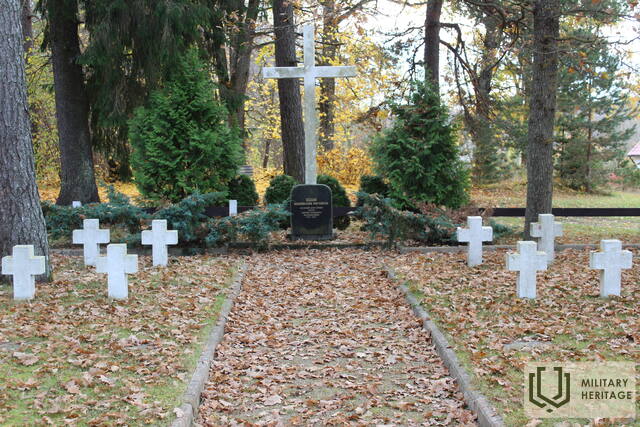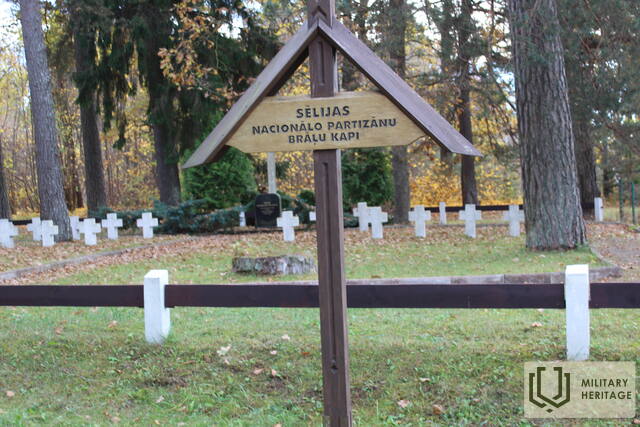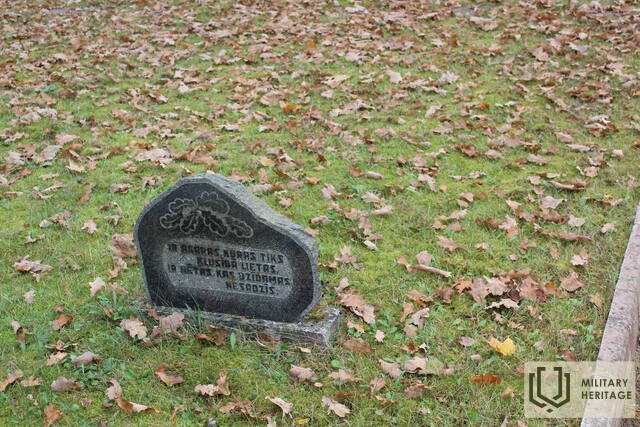Cemeteries of the National Partisans of Sēlia
Memorial site


The Sēlija National Partisan Brothers Cemetery was opened on October 30, 2004 with the support of the Latvian Ministry of Defence and the Aknīste Municipality. The partisans who fell in the battle of December 19, 1949 in the Dimantu Forest of Kalna Parish are buried there: Alberts Karankevičs (1914-1949), Vilis Tunķels (1911-1949), Arnolds Tunķels (1926-1949), Osvalds Tunķels (1929-1949), Ēvalds Kundzāns (1927-1949).
In 2005, the partisans who fell in the battle of February 13, 1945 in the Elkšņi Forest were also reburied here: Juris Alfreds Voldemārs Lācis (1908-1945), Eduards Kaminskis (1910-1945), Osvalds Mežaraups (1911-1945), Alberts Mežaraups (1915-1945), Antons Bružiks (1911-1945), Jānis Britāns (1926-1945) and one unknown. The common cemetery also contains the remains of Marta Mežaraupe (1907-1945), Alberts Lācis (1902-1945), Juris Resnītis (1901-1945) and Pēteris Bite (1907-1945), who were taken hostage by the Soviet occupation authorities and fell during the battle, as well as Voldemārs Otto Sātnieks (1911-1950), a fallen partisan of the Indāns-Grāvelsons group. The Aknīste Brothers' Cemetery also houses a monument to Alfreds Silaraup (1925-1946), a national partisan of the Aknīste Company, who fell during a Cheka operation on July 30, 1946, on the narrow-gauge railway in the Elkšņu Forest.
At the foot of the White Cross erected at the Brothers' Cemetery of the National Partisans of Sēlija, a black granite stele with the emblem of the Latvian National Partisan Association and the text engraved below it, "To the National Partisans of Sēlija. You sacrificed your lives for Latvia in the fight against the communist occupation regime in 1944-1954." There is also a memorial stone in the cemetery with the inscription "There are tears that will be shed in silence. There are scars that will not heal when healed," which was erected by Stanislava Šadurska at the beginning of the Awakening near the pit where the Chekists buried the national partisans and hostages who had fallen the day before on February 14, 1955.
Used sources and references:
H. Bruņinieks. Cheating Death. Riga: Latvian Media, 2022, p. 218.
The Unknown War. The Struggle of Latvian National Partisans Against the Soviet Occupiers 1944-1956. 1st ed. Riga: Domas sūks, 2010, pp. 300-301.
https://karavirukapi.blogspot.com/2022/02/akniste-selijas-nacionalo-partizanu.html
Related timeline
Related topics
Related stories
Selija's forest brother settlement in the Sūpe swamp
The Sūpes swamp is associated with the sites of national partisan settlements and battles, which were formed through the interaction of people and places. It is described in the ballad of the exiled Latvian writer Alberts Eglītis about the events in his native Sūpes swamp “In Moss and Mud” - a tribute to the Sūpes swamp partisans:
… “In 1945, as autumn glowed in the swamp -
On Pokļevinskis' birthday, Lieljānis shares at dinner:
Beer fermented in willows,
The Romulans worship butter,
I dry my mother's caraway bread,
Dried ham in March cuts,
And Stuchka's onions,
Ildzeniece cheese.
Rooms in resinous walls
And lightning has struck hearts,
And in eleven souls languish-
"The roots that have rotted in the ground..."
This interpretation of the past, with its post-World War II events, included human testimonies, expressions of spirit, and value systems. It recalls the popular support for the national partisans, whom the occupying power could not defeat so easily.













